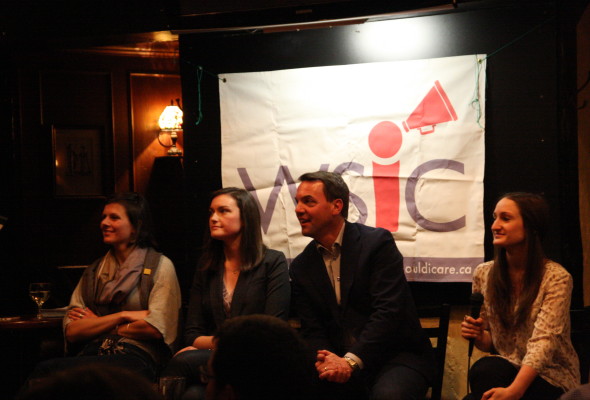Continuing our technology-inspired series at our Uptown branch, our January focus was why we should care about investing in innovation. We were joined by guest speakers Tim Hudak, MPP for Niagara West—Glanbrook and former leader of the Ontario Progressive Conservative Party, Rachel Zimmer, co-founder and Partner of 5Crowd, Sonia Strimban, Manager of Venture Operations at MaRS, and Kelsey Spitz, Senior Associate at Social Innovation Generation.
Taking centre stage was the elephant in the room; Uber. Disruptive technologies tend to illicit strong opinions. Tim Hudak shared his story about how he was motivated to write his private member’s bill, Opportunities in the Sharing Economy. Unable to hail a taxi, one of his staffers was able to hail an Uber ride. His initial thoughts were, he shared, that the service was great and he should make sure governments don’t mess it up. A strong believer in small government, Hudak said that the government’s number one priority is to get out of the way.
Sonia Strimban took a different approach, arguing that governments are great partners in innovation. Without government, there would be no internet. The military is the entity that created the internet. If governments were to take a hands-off approach, there would be far less innovation. She referenced the NASA space projects in the 60s. Without NASA, there would be no memory foam, no handheld vacuums, or satellite TV.
Kelsey Spitz noted that some of the best innovation wasn’t scaling, so the Social Innovation Generation was founded for innovators to work together. She also pointed out the need for governments to become involved. Often, these types of collaborative spaces are funded by governments and they are also the first buyers.
Rachel Zimmer gave the audience a lot of insight into how she, as a young entrepreneur, was able to finance her business. She shared some of the challenges and support systems she has as an entrepreneur in Ontario.
A member of the audience pointed out that innovation funding was geared towards youth. Older people have ideas too that need support. Sonia from MaRS pointed out that the health and green energy space tended to be filled by slightly older people and that MaRS has support opportunities for entrepreneurs over 30. Young people graduating simply don’t have the experience to start ventures in that space.
Overall, the familiar theme noticed in our discussion is that government impacts innovation, whether it plays an active role in supporting it or not, because it creates the conditions that innovators work within. Many commenter seemed to suggest that our society should help entrepreneurs find a place to experiment, provide mentorship opportunities, and break the status quo and image of Canada. Exciting things are happening in Toronto and Waterloo, for example, that could impact the world.







